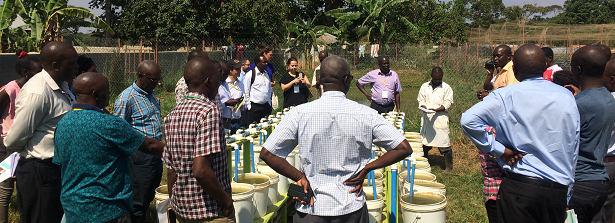Nine Ugandan Food & Business projects gathered to enhance their policy relevance

Representatives of nine Applied Research Fund (ARF) projects – from research, the private sector and NGOs and governmental agencies – gathered for a country workshop in Entebbe on January 26 and 27. They discussed and reflected upon emerging findings and results of research on food security and private sector development, mainly in Uganda but also with a more global focus. The engagement with policy, to enhance the conditions for an enabling environment, was the main theme of the event.
The workshop was organized by NWO-WOTRO Science for Global Development, the Food & Business Knowledge Platform (F&BKP) and RUFORUM. It provided room for acquaintance, exchange and reflection, through presentations, discussions, working group sessions and a field trip. The workshop was aimed at learning, about the respective projects, the ARF programme and the F&BKP as well as approaches to achieving impact, such as through policy engagement.
Focus areas of the projects
Uganda has the highest representation of ARF-projects: nine projects have been funded from 2014 onwards. Some are near their end dates, some have just started their activities.
The nine Ugandan Food & Business Applied Research Fund (ARF) projects all aim to contribute to enhanced food security, by focusing on various components of the food system. Either through enforcements and innovations for existing commodities, such as cassava, rice, tomatoes and sesame, or by introducing new varieties like cashew nuts or greengram. Other projects focus on soil innovations, fortification of cereal or a relatively inexplicit aspect of the Ugandan food system: ethics. Many participants were not familiar with each other’s work and found inspiration in the activities of the other projects. Through working group sessions participants discusses more in-depth how projects could be complementary and which linkages could be enforced through joint actions.
Lessons learned
At the start of the meeting, participants were invited to share their most important lessons of working within ARF projects. Answers included the added value of working with complementary types of expertise in consortia. One project leader stated that research focusing on market perspectives, leading to business models is a worthwhile approach to impact and offers good perspective for sustainability being the project duration. The need for recommendations that fit the local context were also mentioned. As well as the value of working together with farmers, whom offer a wealth of knowledge and are researchers themselves.
Central themes
Throughout the meeting, a re-emerging theme was the inclusion of small scale farmers. This applies to the employed research approaches; often participatory or even farmer-led. It also applies to the objectives of the projects, which look for access to markets for small-holders, without them being overtaken by existing power structures. Another major theme was the need for attention for gender issues, being more ‘than a focus on numbers‘. A gender focus should relate to the position of women within power structures (also within the household), the need for clear divisions of responsibilities and access to finance. Furthermore, an important conclusion was that gender does not just focus on the position of men and women, but should relate to a wider type of social differentiation, including a focus on youth and disabled communities.
Policy engagement
A representative of the Ministry of Agriculture, Animal Industry and Fisheries, Ms Ephrance Tumuboine, presented a reflection on the links between the projects and the existing policy frames. She opened by stating that she had prayed for research that could be applied to policy. And here she found it. Furthermore, the need was emphasised to relate research to priorities of the government and according policy developments, to increase opportunities for findings to be included. ’To push a policy forward, you need to have buy-in, go to the areas the policy applies to and find the relevant policy actors in your line. When the official part is lacking (alignment with policy, approval of government where applicable) it may be difficult to upscale a project.’ Too often, it was mentioned, the scope of projects is too narrow to be relevant to policymakers. By joining forces, the projects may have a stronger, more relevant message to deliver. This resulted in the resolution to develop joint policy briefs.
Field trip
During the second day, the participants went off for a visit to the Tende Innovation’s Fish Farm as well as the Fisheries Resource Research Institute Kajjansi, to learn about innovations in learning in other fields. In both locations the group was received with great hospitality and a wealth of information. An informative closing to a fruitful meeting with informative exchanges and plenty of learning.
_ _ _
Food & Business Research
The Food & Business Applied Research Fund (ARF) and the Global Challenges Programme (GCP) are subsidy schemes of the Dutch Ministry of Foreign Affairs (MoFa), implemented by NWO-WOTRO Science for Global development. The Food & Business Knowledge Platform is an initiative of MoFa. For more information on the ARF and GCP projects see the Food & Business Knowledge Platform website and the Food & Business Research website.





